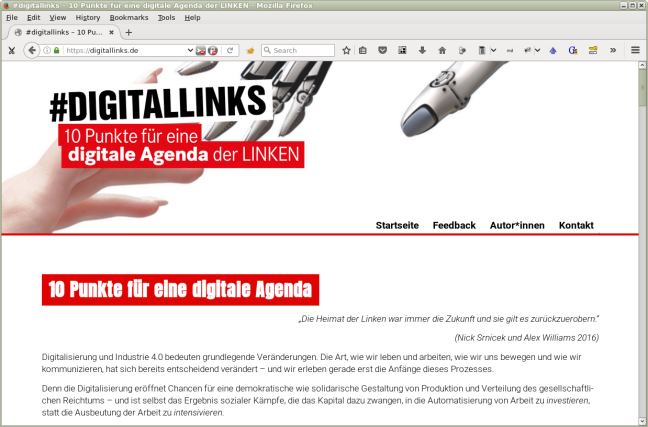One month before the German federal elections, which take place on 24 September, the socialist party Die Linke (The Left) presented its '10 Points for a digital agenda'. Open standards and open source play a pivotal role in the transition to what the party calls "Social State 4.0".
In their publication, the authors — three of whom previously worked for the Pirate Party — have rephrased values and mechanisms from the open world in socialist terms. They contrast cooperation [collaboration, sharing and re-use] with competition and exclusion [proprietary development], pointing out that without patent freedom for software [true in Europe, not necessarily in the USA], network effects, open-source licensing models, the free software movement, open standards and public investment, today's Internet would not exist.
Digital Revolution
According to the authors, digitalisation and automation (the Digital Revolution") should benefit workers. With Work 4.0 and Working Conditions 4.0 as a counterbalance to Germany's Industry 4.0 programme, they advocate a 30-hour working week, a basic income, and at least two sabbaticals during every working lifetime.
It is up to the government to provide the legal and social prerequisites for this new society. Without political regulation, digitalisation can turn into a kind of global feudalism 2.0 [dominated by Big Internet]. The profits of digitalisation must be redistributed, for without a Social State 4.0 there will be no digital democracy.
Economy of the commons
The authors position the Internet community and civil society as forces pushing back against commercial businesses. Everyone who provides a self-developed solution to a problem with a Creative Commons license prevents a company from commercialising this solution.
According to the authors, that calls for the democratisation of the power and resources needed to develop and disseminate such solutions, which they say are currently very unequally distributed.
They want the trend of digitalisation to steer away from neoliberal platform capitalism
and turn technical and social possibilities into an economy of the commons
. Now that social struggles have forced capital to invest in the automation of labor rather than intensify the exploitation of labor, digitalisation opens up opportunities for a democratic and mutually supportive organisation of production and distribution of social wealth.
Openness
Most of the remaining points for the digital agenda relate to other areas where the open movement has been emerging. Cultural products and scientific knowledge (paid for by society) should be free and available to all: as open data (extended to cultural data in the revised PSI Directive) and open knowledge, and through open access and open innovation. To that end, all information should be based on open standards.
Open source
Die Linke takes a similar standpoint with regard to all public goods and services, and utilities. All public networks should be based on open-source infrastructures, and internet access should be free.
In relation to open government and transparency, specifically software used in political processes has to verifiable and modifiable by its users — that is, open source.



Comments
Hello Adrian,
It's always interesting to know what parties say and how they try to get voters with the politization of several areas, in this case Open Source.
By the way their purposes are quite negative and disruptives like "Without political regulation, digitalisation can turn into a kind of global feudalism".
Regulation is synonim of Feudalism. There is a power (who makes the law) and a subdit (surfers). And you have to do exactly what your "owner" says because it has the monopoly of strength.
What happens if a regulator prohibits Open Software because it is "dangerous for the State"?
This is, exactly, the opposite of open source and open Internet. Without freedom there is no Internet, no Open Software, no Open Source.
Does anyone develop a programm and want to be rewarded for his time, resources and knowledege? OK, it's his right, it's logic, and it's an option.
Does anyone develop Open Software because it's a hobby, want to share it and spread it for free? OK, it's his right, it's logic, and it's an option.
But both can co-exist and I'm sure none of them want to be controlled by anyone but their future users, and less by politicians with other interests than the proper software.
Thank you for sharing.
It's a shame that those people try to cancel our freedom and it would be good that all Germans know about it.
Regards,